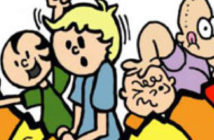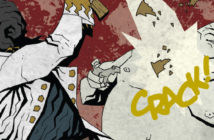There are two possible views of Brian Andersen’s So Super Duper: it’s either trivial or there’s something craftier at work under its surface. I know this because I experienced both views. The book’s (sort of) hero, Psyche, says “tee hee” far too much. Seriously—it gets repetitive fast. However, I’m intrigued by his power: empathy. He can sense the emotions of those around him, making him a rudimentary telepath of sorts.
When I was reading the omnibus of Grant Morrison’s breathtaking New X-Men run, I couldn’t help but dream up my own X-Men to accompany the characters in his stories. One I came up with was Cognition, an empath who could route out liars and evildoers by sensing their feelings and emotions, even when their thoughts were masked, such as by Magneto’s helmet. He wasn’t overtly powerful, but he had his place.
But back to Psyche: I gather these powers stem from Psyche’s partial birthright of being a fairy. And because the character is a closeted gay man, we have an apparent metaphor. But all of this frames a character whose greatest trial is fear. He’s afraid of being a hero (which is understandable, considering his passive abilities), but also of his feelings and identity. This isn’t uncommon with superheroes, especially in the Marvel universe, where the populating superhumans are far more human than super, unlike DC, where it’s the opposite.
Psyche isn’t alone. He’s apart of a team including the leader, Captain Idol, the hunky Comet, and Ultra Woman; there are other characters, but I had a hard time absorbing everyone’s egocentric personalities. The first set of adventures these costume-clad divas embarked on was reviewed back in 2009 by former Broken Frontier writer Dave Baxter, who took an energetic shine to So Super Duper:
“Andersen’s story is organically paced, every issue flowing smooth off the last. It was impossible to break away from, and I devoured the first six issues in a single sitting. Which isn’t to say these are fast reads: they’re breezy, but dense with dialogue, as Andersen displays perhaps his greatest quality as a writer: rambling, anxious, fretting soliloquy.”
As I picked up the series where Baxter left off, I wasn’t so enthusiastic. I feared I was trapped in downward spiral of vapid jokes and superficial observation. I wanted something a bit more poignant and reflective, like in Steve MacIssac’s Shirtlifter and Robert Kirby’s Three. These are unfair comparisons, but I can’t avoid making them. The niche of LGBT comics is small, albeit rich, and they all provide insight into a single human condition.
And yet, while Andersen is no action writer, I softened after all of the superhero brawling cooled off and we were granted a peek into the inner minds of these characters. Quite a few of them are in the closet, and their internalized trials are engaging in their relevance. The interactions between Captain Idol, Comet, and Psyche in issues 10 and 11 reveal poignant struggles and heartaches. We see characters all feeling fear, all in need of a green ring fresh from the armories of Oa.
It’s difficult to gauge what’s a spoiler and what’s not, so I’ll remain tight-lipped out of precaution. Psyche isn’t the only homosexual in the group, and others exist within various stages of realizing who they are. There’s a lot of lost love and painful secrets that come bubbling to the surface, and no one looks like a good guy at the end of the day.
There’s also a marriage proposal at the close of the eleventh issue. And what can I say? It was sweet. I didn’t roll my eyes or sigh, which I do too much in my day-to-day routine already. It was cute and a little uplifting. So Super Duper is far from perfect, but it’s on the right track. Like Andersen’s other comic book, Friend of Dorothy, it shows me a writer who is growing, but also a writer who has something relevant to add to the discourse of LGBT issues in comics.
This comic book review originally appeared on Broken Frontier.




